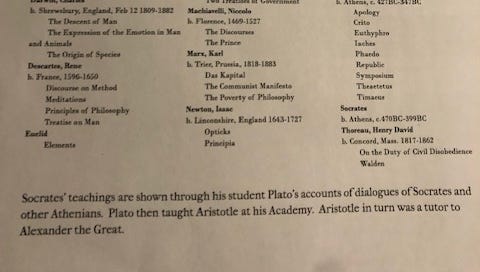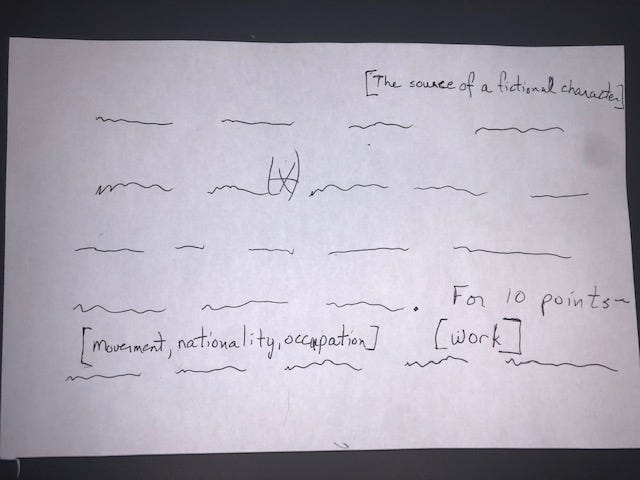Week 148: The next to last and next to first
Clues as coordinates, annual events, and early clues
The first practice of 2023 and we got lots accomplished.
I fulfilled my promise to the team from last week’s newsletter by reducing the college level study guide I had for philosophy down to a single sheet for early high school, but it seems substack doesn’t like including files in your newsletter. Here’s a screenshot of the print version, if you want the PDF for yourself or your team, just ask.
As I said before this is just the first column of five of a study guide written for college. The first column concerns those who are very basic philosophy answers and people who show up philosophy-adjacent (theologians, natural sciences, etc.) but whom are common enough even at lower levels.
Now the spiel I gave the team about this. Those of you who follow the facebook page from the first book may have run into the post I did about clues that give coordinates, this is an extension of that as well as giving a bit of attention to clues that can’t be the last clue of a tossup, but occur after the “For 10 points—”:
“Just as a heads up on the Philosophy Sheet, it's designated Philosophy I because I had a sheet that I did of philosophy works and authors for college students which had five columns. This is the first column, and the only things I expect to see in high school competitions are the first two of those columns. The first column either has people who will come up in other questions which might refer to them as philosophers, or they are really fundamental philosophers whom get mentioned in history courses as key historical figures.
If you immediately think of a philosopher not on this list, it's probably on column II of my big sheet.
I added a little bit of biographical data: birth, death, nationality, because those are other ways that the next to last clues of the question might be set up.
“Name this French philosopher of the Pensees.”
“Name this Greek who recorded the dialogues of his teacher Socrates.”
“Name this English-born philosopher who opined on the American Revolution in his pamphlet "Common Sense."“
“Name this Scholastic philosopher who wrote Summa Theologica.”
I included the major works in this because those end up being
If the question is about a philosopher, they will at some point make the giveaway a work, it’s the quick and dirty way to put a uniquely identifying ending on a question. Before that, the common pattern that they like to use to winnow down the answer to a few is often to put a nationality, or use a school of philosophy in order to tighten the possible answers. The question has already uniquely identified the answer prior to this point, but these types of clues, giving a sort of set of coordinates around time and space allows you to shave possible answers off the list, and confirm your answer if you already have one. It’s not as ironclad or uniquely identifying as the first or last clue must be, but if you’ve got a good enough guess at For 10 points, you can take this type of clue as confirming your suspicions and act upon it before the last clue is given.
The early clues eliminate answers, and there must be early clues which uniquely identify the answer, but because you’re just starting out, you won't necessarily know whether one early clue has eliminated your answer. Later clues still eliminate answers, but in ways you can know about more easily. You’ll be able to make connections that are a lot more explainable: “That's a Greek guy, that's a 20th century person. That guy couldn't comment on this work they're mentioning because he was long dead, or it wasn't translated, or there's some cause and effect relationship that can't have happened.” You can use these late clues as confirmation (or refutation!) of your suspicions, and act accordingly.
I will be taking the sheet and adding the second column to the sheet, on the back. When we get into the second column, we'll pick up new combinations that matter, there's only one Danish philosopher you'll need to know about in high school. You'll find he comes up because he's interesting in how he presents his work, and because he's the only philosopher who made his name from Denmark. The phrase "existential Danish philosopher" can only go to Soren Kierkegaard. And those coordinates of movement nationality and occupation which guide you to the answer better than almost all of his works.
The other reason I stopped at the first column is that I wanted you to start small, and have something you can cover that will cover what you will face in tournaments this year. I also wanted to avoid the at the biggest problem you will find once you push further into philosophy, namely that all the works seem to share all but one of the words in their title with somebody else's works.”
After I had finished with the philosophy sheet for the practice, I brought out the book I mentioned from last week: The Originals. I explained that there’s not a lot of information in this book that they will run across, but all of the things from this book that they will run across will be clues that appear early in the tossup. I even cannibalized the drawing of a tossup that I had used for the coordinates clues discussion. It is reproduced here so you can see how to teach it yourself, when you have a source like The Originals that is all early clues.
(Those of you who know my methods: Yes, I still write notes on recycled half sheet printouts from work. And yes, I included a powermark as a way of dividing up the question to show position. It does help if you’re explaining things like where clues end up)
I made two short observations before we went into reading questions: The first was I've noticed about the past couple months of questions on Hometown Hi-Q: They've paid a lot more attention to the heroic age of Greek myth, than they have to the Olympian gods of late. So what I'm going to do for the next couple of weeks is salt some additional questions on those into the packets we read. That's good insurance for when we get on there.
During practice, I found my next target for a study guide after they whiffed on a mythology tossup with the wrong Greek “P” figure. The consorts of Zeus are like characters inspired by real people, the sort of clues that end up early in a high school question, so I’m going to put that together for next week, and by “put that together,” I mean: copy a page out of the other book I started looking at over break.
That mistake with flipping Pandora for Perseus was also a good opportunity to explain how to deal with mistakes in practice: “Better to do it here and remember not to do it in the game, than to do it in the game and curse yourself out every time after it appears in practice.”
This note is not just for my teams, but for you. We just had the new year, if you may have noticed, there were lots of those "best of 2022", "worst of 2022", and "who we lost", "year in review" articles that floated around news sites and social media. I want you to be aware of those, and maybe look through them, because most writers had the highest amount of free time between Christmas and New Year's. Most writers of questions are either in college, just graduated, or are in education, so there's a break in that week. So if they're looking to make a few bucks, they will work in that period and write questions. (I'm not immune to that, I started extracting questions our of The Originals for the ream over the break.)
The thing about that is that it kind of smears across the calendar. Current events stories usually get bounced from tournament to tournament because they can't repeat the same clues in the same tournament, so if two writers are inspired by the same thing, their work cascades through tournaments.
Things that come up every year, which we can use:
Every year there's a new list of things which enter public domain. Works 95 years or older become public domain on the first of the year. This year there was a list, and the most notable one on that list was the last published Sherlock Holmes stories by Arthur Conan Doyle.
There are laws and policies which change around the world on the first of the year. This year, Croatia abandoned its local currency and joined the Euro bloc., and when this sort of thing happens, writers take note, and write questions about it. If you look at wikipedia's news feed on January 1, you probably pick up about 50 points over the course of rounds throughout the year. (Something I noted to the team: Writers use wikipedia all the time, but they use it as a point to see if their clues are in order, or to get inspiration for a bonus question, or to compare sources. Writers use it, but not without a net. Your teachers have a different, tighter standard for its use. In your classes, defer to the rules of the class.)
News outlets do their people of the year, Pantone does its color of the year, and there's the dictionary's word of the year, banished words for the next year, etc. etc. Most of this is news outlet and promotional clickbait, but it does draw the attention of writers, and inspire them to create. If you see these and get sucked in yourself, observe and know that it may come up in quiz bowl.
After practice, I finished reading through The Originals, and I had notes for about 70 questions. I’m going to spend a couple days expanding those out into and salting the next few practice packets with the level-appropriate ones.
I also contacted the hosts for the next couple events in this area. Pending acceptance of our registration, Seton LaSalle’s team will make its tournament debut on February 18 at Carnegie Mellon. Four and a half weeks, time to get rolling again.




